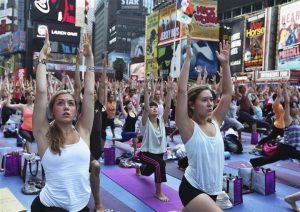Improve Quality of Life with Yoga and Meditation
By John M. de Castro, Ph.D.
“Though the benefits of a yoga practice initially arrive on our mats, a regular practice expands those benefits as they permeate into our daily lives beyond the four corners of our mats.” – Crystal Borup-Popenoe
Yoga practice has been shown to have a myriad of benefits for psychological and physical health, social, and spiritual well-being. It is both an exercise and a mind-body practice those stresses both mental attention to present moment movements, breath control, and flexibility, range of motion, and balance.
In today’s Research News article “Health-Related Quality of Life Outcomes With Regular Yoga and Heartfulness Meditation Practice: Results From a Multinational, Cross-sectional Study.” (See summary below or view the full text of the study at: https://www.ncbi.nlm.nih.gov/pmc/articles/PMC9116454/ ) Thimmapuram and colleagues recruit participants in the International Day of Yoga 100 day Yoga and heartfulness meditation practice online from countries around the world and had them complete measures of yoga practice, health-related quality of life, relaxation, nervousness, and stress.
Both regular yoga practitioners and also heartfulness meditation practitioners in comparison to those who were not had significantly higher health-related quality of life, healthy lifestyle, ability to cope with stress, workplace productivity, relaxation, and staying healthy during Covid-19 and lower levels of stress. Hence, regular practitioners of yoga or heartfulness meditation were associated with greater health and well-being.
The study does not establish causation but provide evidence that the relationship of the practices to health and well-being occur regardless of country.
“Moderate‐quality evidence supports the recommendation of yoga as a supportive intervention for improving health‐related quality of life and reducing fatigue and sleep disturbances when compared with no therapy, as well as for reducing depression, anxiety and fatigue, when compared with psychosocial/educational interventions. “ – Holger Cramer
CMCS – Center for Mindfulness and Contemplative Studies
This and other Contemplative Studies posts are also available on Twitter @MindfulResearch
Study Summary
Thimmapuram, J., Patel, K., Madhusudhan, D. K., Deshpande, S., Bouderlique, E., Nicolai, V., & Rao, R. (2022). Health-Related Quality of Life Outcomes With Regular Yoga and Heartfulness Meditation Practice: Results From a Multinational, Cross-sectional Study. JMIR formative research, 6(5), e37876. https://doi.org/10.2196/37876
Abstract
Background
Although the benefits of yoga are well established across the world, there are limited studies exploring the long-term interrelation between yoga, meditation, and health. Specifically, there is limited research exploring the differences in health-related quality of life (HRQOL) among regular meditators and nonmeditators.
Objective
This study explored the differences in 7 domains of HRQOL (including quality of life, ability to adopt a healthy lifestyle, ability to relax, frequency of nervousness and stress, coping with day-to-day stress, workplace productivity, and staying healthy during the COVID-19 pandemic) among practitioners of yoga and meditation.
Methods
A cross-sectional, online survey was distributed to all members who participated in a 100-day yoga and meditation program, culminating in the International Day of Yoga event, organized by the Heartfulness Institute in partnership with the Central Council for Research in Yoga and Naturopathy, Ministry of Ayush, SVYASA Yoga University, and Patanjali Yoga Institute, India. The program consisted of daily virtual yoga, meditation, and speaker sessions. The data were analyzed by nonparametric Mann-Whitney U test and Kruskal-Wallis tests for continuous variables and chi-square test for categorical variables.
Results
A total of 3164 participants from 39 countries completed the survey. Mean age was 33.8 (SD 13.6) years. The majority of the participants were female (n=1643, 52%) and students (n=1312, 41.5%). Regular yoga and meditation practice was associated with a positive impact on all 7 domains of HRQOL (Mann-Whitney P<.05 and χ2 P<.05). Notably, experienced Heartfulness (≥2 years) meditators reported better outcomes in all the domains of HRQOL as compared to those not currently practicing this form of meditation and participants with ≤1 year of Heartfulness meditation experience (P<.05).
Conclusions
This is one of the first cross-sectional studies to explore HRQOL outcomes among participants of a 100-day virtual yoga and meditation program. Overall, a yoga and meditation practice was found to be an effective tool for promoting HRQOL. Regular yoga and meditation practice was associated with factors promoting health and well-being, with long-term meditation practice associated with increased benefits.
